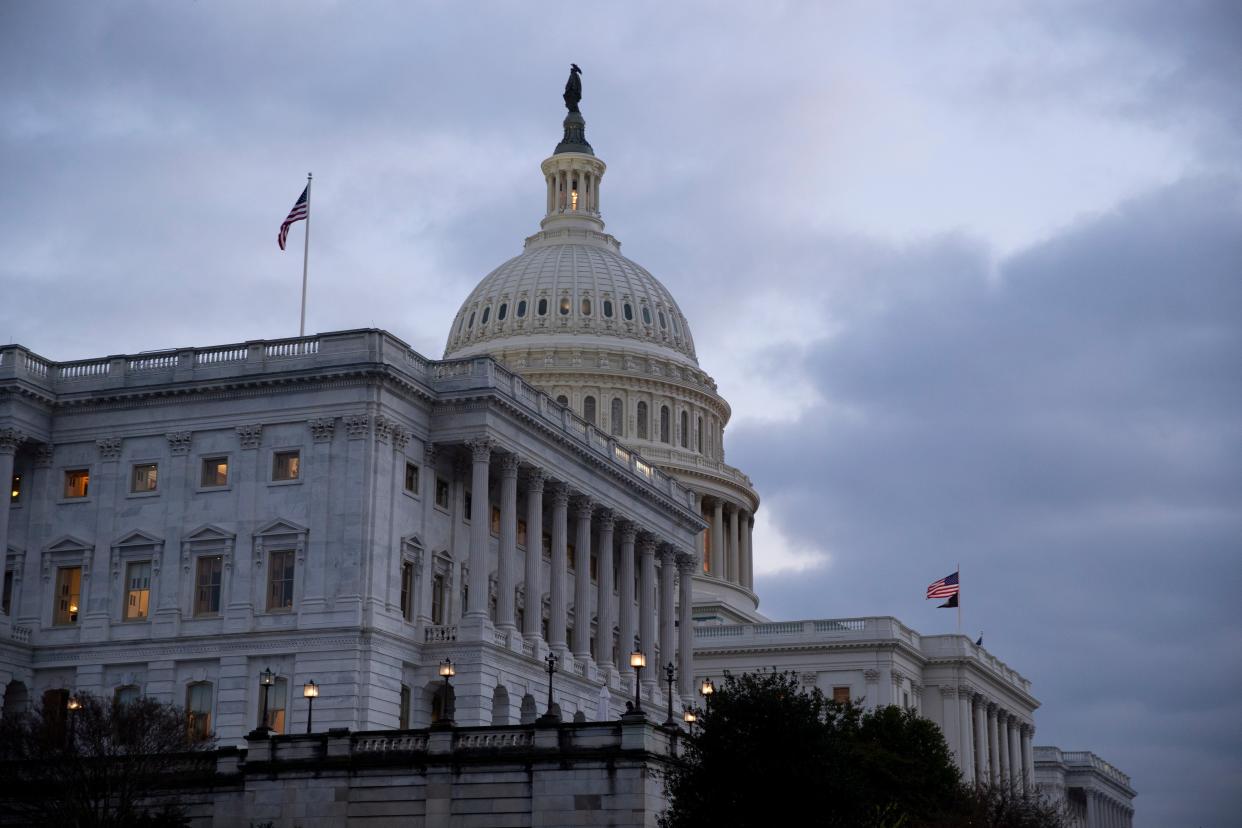Congress narrowly avoids looming shutdown as row continues over Covid relief deal

Congress has approved a two-day stop-gap measure to avoid a government shutdown and continue debate over critically needed coronavirus relief, while millions of unemployed and struggling Americans face looming expiration dates for jobless aid and eviction moratoriums.
Lawmakers approached a midnight deadline on Friday to approve new legislation or appropriations funding the government or risk a shutdown while the contours of a $900bn coronavirus relief package remain unclear.
With five hours before the deadline, the House of Representatives voted 320-60 followed by an affirmative vote in the Senate to support a one-page resolution to keep the government funded through Sunday. House lawmakers adjourned until Sunday afternoon.
Congressional leaders agreed to include $300 federal unemployment aid added to unemployment benefits, along with small business funding, government assistance to distribute the Covid-19 vaccine, and some form of direct payments to millions of Americans following a one-time check of $1,200 eight months ago.
But a last-minute push on Friday among Republicans to reject similarly sized cash payments and cut off the Federal Reserve’s emergency lending abilities threatened to derail lawmakers’ often frustrated and languorous progress.
Senator Pat Toomey of Pennsylvania introduced a measure to kneecap the incoming Joe Biden administration by limiting the Federal Reserve’s emergency lending powers under the CARES Act, which could significantly undercut the president-elect’s efforts to repair the economy and address the public health crisis when he enters office.
In March, the nation’s central bank slashed interest rates and flooded banks with cash; Republicans now have sought legislation to prevent similar emergency lending efforts in the future, a measure that Democratic Senator Brian Schatz said “is the reason we don’t have a deal”.
While Congress has agreed that there should be some form of direct checks to Americans, following a one-time payment from April that put $1,200 into millions of Americans’ bank accounts, Republicans have rejected efforts to do the same, eight months later, as the pandemic and its effects worsen.
Republican Senator Ron Johnson rejected attempts from Senator Bernie Sanders as well as Republican Senator Josh Hawley of Missouri to approve another round of $1,200 payments.
Senator Johnson repeatedly said that the costs of direct checks to Americans would be “mortgaging our kids’ future” despite his own support for the $2.2trn CARES Act package along with the president’s $1.75trn tax cuts and the recent passage of a $741bn defence budget.
“We do not have an unlimited checking account,” he said. “We have to be concerned about these things.”
The senator argued that the national debt – which has ballooned by $7trn to $27trn within Trump’s term, which the senator has steadfastly supported – can’t withstand additional financial relief for struggling Americans.
“In this time of crisis, it is comical that suddenly our Republican friends, once again, discover that we have a deficit,” Senator Sanders said. “This is a moment of emergency ... We have got to respond to the needs of working families.”
In April, the senator had initially proposed $2,000 a month payments, along with guaranteed paid sick and family leave and hazard pay for essential workers as part of the HEROES Act, rejected by the GOP-controlled Senate.
“If this country means anything, if democracy means anything, if the US government means anything, it means we cannot turn our backs on this suffering,” Senator Sanders said. “It means we cannot leave Washington as senators for the holidays to go back to our families unless we address the pain and anxiety of other families in this country.”
New York Senator Chuck Schumer also pushed for $1,200 payments, arguing that “much of the money will go back into the economy anyway.”
“We have an opportunity in this emergency relief bill to give financial relief directly,” he said. “All of a sudden the deficit scolds are back. It’s ludicrous."
Without immediate intervention from Congress, extended unemployment relief is set to expire on 26 December for roughly 12 million jobless Americans; a moratorium on evictions that could impact 30 million Americans is set to expire on 31 December.
Even if Congress agrees to a deal that extends unemployment relief, benefits could be delayed by up to three weeks as the system catches up, leaving a gap of crucial relief for millions of Americans.
Read More
Snags on COVID-19 relief may force weekend sessions
Congress makes ‘major headway’ on Covid deal, after months of deadlock

